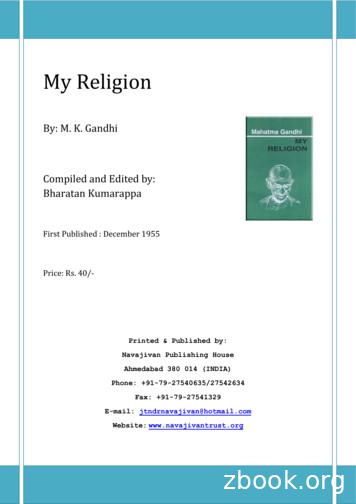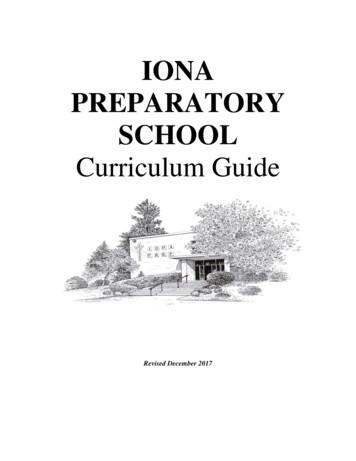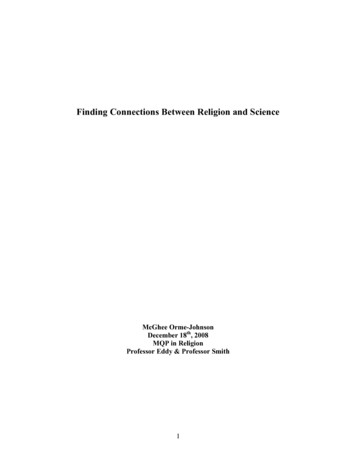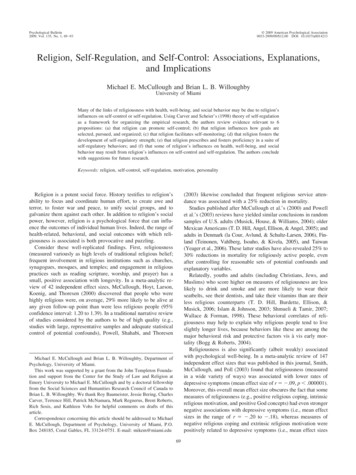Foundations Requirements Religion Requirements TAKE
Foundations RequirementsComplete the following foundations requirements.English RequirementsTAKE THESE COURSES:FDENG 101: Writing and ReasoningFDENG 201: Adv Writing and Critical ThinkingScience RequirementsTAKE THIS COURSE:FDSCI 101: Science FoundationsTAKE 5 CREDITS FROM THESE COURSES:FDSCI 200: Energy in the 21st Century (3 Credits)FDSCI 201: Natural Disasters (3 Credits)FDSCI 202: Issues in Global Climate Change (2 Credits)FDSCI 203: Environmental Stewardship (2 Credits)FDSCI 204: The American Epidemic (3 Credits)FDSCI 205: Understanding DNA (3 Credits)FDSCI 206: Light & Sound (3 Credits)FDSCI 207: Origins of Universe, Earth, & Life (3 Credits)FDSCI 299: Special Topics in Science (3 Credits)American Foundations RequirementsTAKE THIS COURSE:FDAMF 101: American FoundationsCultural Awareness RequirementsOPTION 1TAKE THIS COURSE:FDCA 101: Foundations of HumanitiesTAKE 1 OF THESE COURSES:FDCA 201: Global Hotspot: PakistanFDCA 202: The Developing WorldFDCA 203: The Middle EastFDCA 204: Art and PropagandaFDCA 205: ChinaFDCA 206: Great Books of the WorldFDCA 299: Topics in Cultural AwarenessOPTION 2TAKE THESE COURSES:FDWLD 101: World Foundations 1FDWLD 201: World Foundations 2Religion RequirementsTAKE THESE COURSES:FDREL 121: Book of Mormon 1FDREL 122: Book of Mormon 2FDREL 200: Family FoundationsTAKE 2 COURSES:FDREL 211: New TestamentFDREL 212: New TestamentEmphasisFDREL 301: OldTestament ModulesFDREL 302: Old TestamentFDREL 324: Doctrine and CovenantsFDREL 325: Doctrine and CovenantsFDREL 327: Pearl of Great PriceTAKE 2 COURSES:FDREL 100: Intro to MormonismFDREL 130: Mission PreparationFDREL 150: Provident LivingFDREL 190: Special Topics in ScriptureFDREL 215: Scripture Study SkillsFDREL 234: Preparing for Eternal MarriageFDREL 235: Building an Eternal MarriageFDREL 261: Intro to LDS Family HistoryFDREL 333: Teachings of the Living ProphetsFDREL 341: LDS History, 1805-1844FDREL 342: LDS History, 1844-1901FDREL 343: LDS History, 1901-PresentLiterary Studies Module (15 Credits)FDREL 351: The Gospel and World ReligionsFDREL 352: The Gospel and Christian HistoryFDREL 390R: Special Topics in ReligionFDREL 404: Writings of IsaiahFDREL 431: Doctrines of the GospelFDREL 471: Methods of Teaching SeminaryFDREL 475: Seminary SeminarMath RequirementsTAKE THIS COURSE:FDMAT 108: Math for the Real WorldNOTE: You can also fulfill the math requirement bypassing FDMAT 108T: Math for the Real World Test andby completing either FDMAT 110, FDMAT 112, Math109, Math 113, Math 215, or Econ 215.Connections RequirementsTAKE THIS COURSE:FDCNC 350: Analytical Thinking and Moral JudgmentEnglish Ed Major:First FieldACADEMIC PLANCatalog Year 2013-2014
English Ed Major: First FieldENGLISH ED MAJOR GUIDELINES(59 Credit Hours)A single course cannot count toward two modules.Unless you are taking a class to replace a grade, onlycourses with “R” may be repeated (i.e., ENG 370R,350R, etc).To earn a degree in English education with Englishas your first field, you must complete four coursemodules along with an approved minor. A “module” isa collection of classes, grouped around a specific skill orinterest. Modules range from 12 to 23 credit hours.Introductory Module (12 Credits)TAKE THESE COURSES:ENG 251: Fundamentals of Literary InterpretationENG 252: Fundamentals of Research & PresentationENG 314: Advanced Research and Literary AnalysisENG 325: Language Theory: Grammar and UsageLiterature Module (12 Credits)TAKE 1 COURSE:ENG 331: Brit Lit: Medieval and RenaissanceENG 332: Brit Lit: Neoclassic and RomanticENG 333: Brit Lit: Victorian and ModernENG 336: Contemporary British and American LitTAKE 1 COURSE:ENG 334: Am Lit: Colonial and RomanticENG 335: Am Lit: Realism and ModernENG 336: Contemporary British and American LitTAKE 1 COURSE FROM 2 CATEGORIES:CATEGORY 1: AUTHORSENG 370R: Major AuthorsENG 373: ShakespeareCATEGORY 2: GENRESENG 351: FictionENG 352: PoetryENG 353: DramaENG 354: Non-fictionENG 355: Children’s LiteratureENG 356: Young Adult LiteratureCATEGORY 3: THEMESENG 350R: Themes in LiteratureAs a general rule, take 200-level courses early, andreserve 300- and 400-level courses for your junior andsenior years. Capstone courses should be taken yourfinal semester.The following classes must be taken the samesemester, preferably the semester immediatelybefore your student teaching:ENG 430: Methods 2ED 461: Reading in the Content AreaSPED 360: Exceptional StudentsYou must pass the Praxis exam before registering forED 492: Student Teaching.English Education Module (12 Credits)TAKE THESE COURSES:ENG 356: Young Adult LiteratureENG 429: Methods 1ENG 430: Methods 2ENG 450: Rhetorical StudiesTeacher Education Module (23 Credits)TAKE THESE COURSES:ED 200: History and Philosophy of EducationED 304: Educational PsychologyED 361: Secondary Education Principles of TeachingED 461: Reading in the Content AreaED 492: Student TeachingSPED 360: Exceptional Students in the 6th-12th GradesApproved Education MinorsCOMPLETE ONE OF THESE APPROVED MINORS:American Government EducationArt Education (K-12)Biology EducationChemistry EducationChinese Education (K-12)Earth Science EducationEconomics EducationFrench Education (K-12)Geography EducationGerman Education (K-12)Health EducationHistory EducationJournalism EducationMathematics EducationNatural Science EducationOnline Instruction EndorsementPhysical Education TeachingPhysical Science EducationPhysics EducationRussian Education (K-12)Spanish Education (K-12)TESOL EducationTheatre & Speech EducationFOR ACADEMIC ADVISING,CONTACT YOUR ACADEMICDISCOVERY CENTERSEd Advising: HIN 309, 496-9850English Advising: SMI 269, 496-9875
Foundations RequirementsComplete the following foundations requirements.English RequirementsTAKE THESE COURSES:FDENG 101: Writing and ReasoningFDENG 201: Adv Writing and Critical ThinkingScience RequirementsTAKE THIS COURSE:FDSCI 101: Science FoundationsTAKE 5 CREDITS FROM THESE COURSES:FDSCI 200: Energy in the 21st Century (3 Credits)FDSCI 201: Natural Disasters (3 Credits)FDSCI 202: Issues in Global Climate Change (2 Credits)FDSCI 203: Environmental Stewardship (2 Credits)FDSCI 204: The American Epidemic (3 Credits)FDSCI 205: Understanding DNA (3 Credits)FDSCI 206: Light & Sound (3 Credits)FDSCI 207: Origins of Universe, Earth, & Life (3 Credits)FDSCI 299: Special Topics in Science (3 Credits)American Foundations RequirementsTAKE THIS COURSE:FDAMF 101: American FoundationsCultural Awareness RequirementsOPTION 1TAKE THIS COURSE:FDCA 101: Foundations of HumanitiesTAKE 1 OF THESE COURSES:FDCA 201: Global Hotspot: PakistanFDCA 202: The Developing WorldFDCA 203: The Middle EastFDCA 204: Art and PropagandaFDCA 205: ChinaFDCA 206: Great Books of the WorldFDCA 299: Topics in Cultural AwarenessOPTION 2TAKE THESE COURSES:FDWLD 101: World Foundations 1FDWLD 201: World Foundations 2Religion RequirementsTAKE THESE COURSES:FDREL 121: Book of Mormon 1FDREL 122: Book of Mormon 2FDREL 200: Family FoundationsTAKE 2 COURSES:FDREL 211: New TestamentFDREL 212: New TestamentEmphasisFDREL 301: OldTestament ModulesFDREL 302: Old TestamentFDREL 324: Doctrine and CovenantsFDREL 325: Doctrine and CovenantsFDREL 327: Pearl of Great PriceTAKE 2 COURSES:FDREL 100: Intro to MormonismFDREL 130: Mission PreparationFDREL 150: Provident LivingFDREL 190: Special Topics in ScriptureFDREL 215: Scripture Study SkillsFDREL 234: Preparing for Eternal MarriageFDREL 235: Building an Eternal MarriageFDREL 261: Intro to LDS Family HistoryFDREL 333: Teachings of the Living ProphetsFDREL 341: LDS History, 1805-1844FDREL 342: LDS History, 1844-1901FDREL 343: LDS History, 1901-PresentLiterary Studies Module (15 Credits)FDREL 351: The Gospel and World ReligionsFDREL 352: The Gospel and Christian HistoryFDREL 390R: Special Topics in ReligionFDREL 404: Writings of IsaiahFDREL 431: Doctrines of the GospelFDREL 471: Methods of Teaching SeminaryFDREL 475: Seminary SeminarMath RequirementsTAKE THIS COURSE:FDMAT 108: Math for the Real WorldNOTE: You can also fulfill the math requirement bypassing FDMAT 108T: Math for the Real World Test andby completing either FDMAT 110, FDMAT 112, Math109, Math 113, Math 215, or Econ 215.Connections RequirementsTAKE THIS COURSE:FDCNC 350: Analytical Thinking and Moral JudgmentEnglish Ed Major:Only FieldACADEMIC PLANCatalog Year 2013-2014
English Ed Major: Only FieldENGLISH ED MAJOR GUIDELINES(68 Credit Hours)A single course cannot count toward two modules.Unless you are taking a class to replace a grade, onlycourses with “R” may be repeated (i.e., ENG 370R,350R, etc).To earn a degree in English education with English asyour only field, you must complete five course modules.A “module” is a collection of classes, grouped arounda specific skill or interest. Modules range from 6 to 23credit hours.Introductory Module (12 Credits)TAKE THESE COURSES:ENG 251: Fundamentals of Literary InterpretationENG 252: Fundamentals of Research & PresentationENG 314: Advanced Research and Literary AnalysisENG 325: Language Theory: Grammar and UsageLiterature Module (12 Credits)TAKE 1 COURSE:ENG 331: Brit Lit: Medieval and RenaissanceENG 332: Brit Lit: Neoclassic and RomanticENG 333: Brit Lit: Victorian and ModernENG 336: Contemporary British and American LitTAKE 1 COURSE:ENG 334: Am Lit: Colonial and RomanticENG 335: Am Lit: Realism and ModernENG 336: Contemporary British and American LitTAKE 1 COURSE FROM 2 CATEGORIES:CATEGORY 1: AUTHORSENG 370R: Major AuthorsENG 373: ShakespeareCATEGORY 2: GENRESENG 351: FictionENG 352: PoetryENG 353: DramaENG 354: Non-fictionENG 355: Children’s LiteratureENG 356: Young Adult LiteratureCATEGORY 3: THEMESENG 350R: Themes in LiteratureAs a general rule, take 200-level courses early, andreserve 300- and 400-level courses for your junior andsenior years. Capstone courses should be taken yourfinal semester.The following classes must be taken the samesemester, preferably the semester immediatelybefore your student teaching:ENG 430: Methods 2ED 461: Reading in the Content AreaSPED 360: Exceptional StudentsYou must pass the Praxis exam before registering forED 492: Student Teaching.English Education Module (15 Credits)TAKE THESE COURSES:ENG 356: Young Adult LiteratureENG 429: Methods 1ENG 430: Methods 2ENG 450: Rhetorical StudiesTAKE 1 COURSE:ENG 452: Advanced Professional Writing (Capstone)ENG 495: Senior Writing Seminar (Capstone)Teacher Education Module (23 Credits)TAKE THESE COURSES:ED 200: History and Philosophy of EducationED 304: Educational PsychologyED 361: Secondary Education Principles of TeachingED 461: Reading in the Content AreaED 492: Student TeachingSPED 360: Exceptional Students in the 6th-12th GradesEnglish Electives Module (6 Credits)TAKE ANY 2 COURSES:ENG 318R: Advanced Creative WritingENG 321: Technology for Professional WritersENG 326: EditingENG 327: Language Theory: Grammar and UsageENG 331: Brit Lit: Medieval and RenaissanceENG 332: Brit Lit: Neoclassic and RomanticENG 333: Brit Lit: Victorian and ModernENG 334: Am Lit: Colonial and RomanticENG 335: Am Lit: Realism and ModernENG 336: Contemporary British and American LitENG 350R: Themes in LiteratureENG 351: FictionENG 352: PoetryENG 353: DramaENG 354: Non-fictionENG 355: Children’s LiteratureENG 356: Young Adult LiteratureENG 370R: Major AuthorsENG 373: ShakespeareENG 398R: Internship (or 3 semesters of I-comm)ENG 400R: Genres of Professional WritingENG 418R: Creative Writing/PublishingENG 440: Literary TheoryENG 452: Advanced Professional Writing (Capstone)ENG 495: Senior Writing Seminar (Capstone)FOR ACADEMIC ADVISING,CONTACT YOUR ACADEMICDISCOVERY CENTERSEd Advising: HIN 309, 496-9850English Advising: SMI 269, 496-9875
Foundations RequirementsComplete the following foundations requirements.English RequirementsTAKE THESE COURSES:FDENG 101: Writing and ReasoningFDENG 201: Adv Writing and Critical ThinkingScience RequirementsTAKE THIS COURSE:FDSCI 101: Science FoundationsTAKE 5 CREDITS FROM THESE COURSES:FDSCI 200: Energy in the 21st Century (3 Credits)FDSCI 201: Natural Disasters (3 Credits)FDSCI 202: Issues in Global Climate Change (2 Credits)FDSCI 203: Environmental Stewardship (2 Credits)FDSCI 204: The American Epidemic (3 Credits)FDSCI 205: Understanding DNA (3 Credits)FDSCI 206: Light & Sound (3 Credits)FDSCI 207: Origins of Universe, Earth, & Life (3 Credits)FDSCI 299: Special Topics in Science (3 Credits)American Foundations RequirementsTAKE THIS COURSE:FDAMF 101: American FoundationsCultural Awareness RequirementsOPTION 1TAKE THIS COURSE:FDCA 101: Foundations of HumanitiesTAKE 1 OF THESE COURSES:FDCA 201: Global Hotspot: PakistanFDCA 202: The Developing WorldFDCA 203: The Middle EastFDCA 204: Art and PropagandaFDCA 205: ChinaFDCA 206: Great Books of the WorldFDCA 299: Topics in Cultural AwarenessOPTION 2TAKE THESE COURSES:FDWLD 101: World Foundations 1FDWLD 201: World Foundations 2Religion RequirementsTAKE THESE COURSES:FDREL 121: Book of Mormon 1FDREL 122: Book of Mormon 2FDREL 200: Family FoundationsTAKE 2 COURSES:FDREL 211: New TestamentFDREL 212: New TestamentEmphasisFDREL 301: OldTestament ModulesFDREL 302: Old TestamentFDREL 324: Doctrine and CovenantsFDREL 325: Doctrine and CovenantsFDREL 327: Pearl of Great PriceTAKE 2 COURSES:FDREL 100: Intro to MormonismFDREL 130: Mission PreparationFDREL 150: Provident LivingFDREL 190: Special Topics in ScriptureFDREL 215: Scripture Study SkillsFDREL 234: Preparing for Eternal MarriageFDREL 235: Building an Eternal MarriageFDREL 261: Intro to LDS Family HistoryFDREL 333: Teachings of the Living ProphetsFDREL 341: LDS History, 1805-1844FDREL 342: LDS History, 1844-1901FDREL 343: LDS History, 1901-PresentStudies(15 Credits)FDRELLiterary351: The GospelandModuleWorld ReligionsFDREL 352: The Gospel and Christian HistoryFDREL 390R: Special Topics in ReligionFDREL 404: Writings of IsaiahFDREL 431: Doctrines of the GospelFDREL 471: Methods of Teaching SeminaryFDREL 475: Seminary SeminarMath RequirementsTAKE THIS COURSE:FDMAT 108: Math for the Real WorldNOTE: You can also fulfill the math requirement bypassing FDMAT 108T: Math for the Real World Test andby completing either FDMAT 110, FDMAT 112, Math109, Math 113, Math 215, or Econ 215.Connections RequirementsTAKE THIS COURSE:FDCNC 350: Analytical Thinking and Moral JudgmentEnglish MajorACADEMIC PLANCatalog Year 2013-2014
English MajorENGLISH MAJOR GUIDELINES(51-54 Credit Hours)A single course cannot count toward two modules.Unless you are taking a class to replace a grade, onlycourses with “R” may be repeated (i.e., ENG 370R,350R, etc).TAKE THESE COURSES:ENG 218: Creative WritingENG 318R: Advanced Creative WritingENG 418R: Creative Writing/PublishingAs a general rule, take 200-level courses early, andreserve 300- and 400-level courses for your juniorand senior years. Capstone courses should be takenyour final semester.TAKE 1 COURSE A SECOND TIME:ENG 318R: Advanced Creative WritingENG 418R: Creative Writing/PublishingTo earn a degree in English, you must complete four ofsix possible course modules. A “module” is a collectionof classes, grouped around a specific skill or interest.Modules range from 12 to 15 credit hours.Required ModulesTwo of the modules offered by the English departmentare required of all English majors.Required Introductory Module (12 Credits)TAKE THESE COURSES:ENG 251: Fundamentals of Literary InterpretationENG 252: Fundamentals of Research & PresentationENG 314: Advanced Research and Literary AnalysisENG 325: Language Theory: Grammar and UsageRequired Literature Module (12 Credits)TAKE 1 COURSE:ENG 331: Brit Lit: Medieval and RenaissanceENG 332: Brit Lit: Neoclassic and RomanticENG 333: Brit Lit: Victorian and ModernENG 336: Contemporary British and American Lit*TAKE 1 COURSE:ENG 334: Am Lit: Colonial and RomanticENG 335: Am Lit: Realism and ModernENG 336: Contemporary British and American Lit*TAKE 1 COURSE FROM 2 CATEGORIES:CATEGORY 1: AUTHORSENG 370R: Major AuthorsENG 373: ShakespeareCATEGORY 2: GENRESENG 351: FictionENG 352: PoetryENG 353: DramaENG 354: Non-fictionENG 355: Children’s LiteratureENG 356: Young Adult LiteratureCATEGORY 3: THEMESENG 350R: Themes in Literature* ENG 336 can count toward only one requirement in this module.Optional ModulesEmphasisModulesFour of the modules offered by the English departmentare “optional modules,” and to graduate you mustcomplete two of them.Professional Writing Module (15 Credits)TAKE THESE COURSES:ENG 321: Technology for Professional WritersENG 326: EditingENG 398R: Internship (or 3 semesters of I-comm)ENG 452: Advanced Professional Writing (Capstone)TAKE 1 COURSE:ENG 400R: Genres of Professional WritingENG 450: Rhetorical StudiesLiterary Studies Module (15 Credits)TAKE 1 COURSE:ENG 331: Brit Lit: Medieval and RenaissanceENG 332: Brit Lit: Neoclassic and RomanticENG 333: Brit Lit: Victorian and ModernENG 336: Contemporary British and American LitTAKE 1 COURSE:ENG 334: Am Lit: Colonial and RomanticENG 335: Am Lit: Realism and ModernENG 336: Contemporary British and American LitTAKE 1 COURSE:ENG 350R: Themes in LiteratureENG 370R: Major AuthorsENG 373: ShakespeareTAKE THESE COURSES:ENG 440: Studies in Literary TheoryENG 495: Senior Writing Seminar (Capstone)Creative Writing Module (15 Credits)TAKE 1 COURSE:ENG 452: Advanced Professional Writing (Capstone)ENG 495: Senior Writing Seminar (Capstone)Student Choice Module (12 Credits)TAKE 4 COURSES:ENG 318R: Advanced Creative WritingENG 321: Technology for Professional WritersENG 326: EditingENG 327: History of the English LanguageENG 331: Brit Lit: Medieval and RenaissanceENG 332: Brit Lit: Neoclassic and RomanticENG 333: Brit Lit: Victorian and ModernENG 334: Am Lit: Colonial and RomanticENG 335: Am Lit: Realism and ModernENG 336: Contemporary British and American LitENG 350R: Themes in LiteratureENG 351: FictionENG 352: PoetryENG 353: DramaENG 354: Non-fictionENG 355: Children’s LiteratureENG 356: Young Adult LiteratureENG 370R: Major AuthorsENG 373: ShakespeareENG 398R: Internship (or 3 semesters of I-comm)ENG 400R: Genres of Professional WritingENG 418R: Creative Writing and PublishingENG 440: Studies in Literary TheoryENG 450: Rhetorical StudiesENG 452: Advanced Professional Writing (Capstone)ENG 495: Senior Writing Seminar (Capstone)YOUR ACADEMIC DISCOVERY CENTER:SMI 269, 496-9875
English MinorsThe English department offers two minors—an Englishminor and an English education minor. You shouldcomplete the English education minor if you’re aneducation major in another discipline and you wish toqualify to teach English as your second field.Minor in English (18 Credits)TAKE THESE COURSES:ENG 251: Fundamentals of Literary InterpretationENG 314: Advanced Research and Literary AnalysisTAKE 4 COURSES:ENG 218: Creative WritingENG 252: Fundamentals of Research & PresentationENG 318R: Advanced Creative WritingENG 321: Technology for Professional WritersENG 325: Language Theory: Grammar and UsageENG 326: EditingENG 327: History of the English LanguageENG 331: Brit Lit: Medieval and RenaissanceENG 332: Brit Lit: Neoclassic and RomanticENG 333: Brit Lit: Victorian and ModernENG 334: Am Lit: Colonial and RomanticENG 335: Am Lit: Realism and ModernENG 336: Contemporary British and American LitENG 350R: Themes in LiteratureENG 351: FictionENG 352: PoetryENG 353: DramaENG 354: Non-fictionENG 355: Children’s LiteratureENG 356: Young Adult LiteratureENG 370R: Major AuthorsENG 373: ShakespeareENG 400R: Genres of Professional WritingENG 418R: Creative Writing and PublishingENG 429: Teaching Methods 1ENG 430: Teaching Methods 2ENG 440: Studies in Literary TheoryENG 450: Rhetorical StudiesENG 452: Advanced Professional Writing (Capstone)ENG 495: Senior Writing Seminar (Capstone)ENGLISH MINOR GUIDELINESEnglish Minor 18 CreditsEnglish Ed Minor 21 CreditsUnless you are taking a class to replace a grade, onlycourses with “R” may be repeated (i.e., ENG 370R,350R, etc). As a general rule, take 200-level coursesearly, and reserve 300- and 400-level courses for yourjunior and senior years.Minor in English Education (21 Credits)TAKE THESE COURSES:ENG 251: Fundamentals of Literary InterpretationENG 314: Advanced Research and Literary AnalysisENG 325: Language Theory: Grammar and UsageENG 429: Teaching Methods 1ENG 450: Rhetorical StudiesTAKE 1 COURSE:ENG 331: Brit Lit: Medieval and RenaissanceENG 332: Brit Lit: Neoclassic and RomanticENG 333: Brit Lit: Victorian and ModernENG 336: Contemporary British and American Lit*TAKE 1 COURSE:ENG 334: Am Lit: Colonial and RomanticENG 335: Am Lit: Realism and ModernENG 336: Contemporary British and American Lit** ENG 336 can count toward only one requirement in this minor.FOR ACADEMIC ADVISING,CONTACT YOUR ACADEMICDISCOVERY CENTERSEd Advising: HIN 309, 496-9850English Advising: SMI 269, 496-9875English Minors &ConcentrationsACADEMIC PLANCatalog Year 2013-2014
English ConcentrationsIf you are majoring in interdisciplinary studies, you mustcomplete at least one concentration. A “concentration”is a collection of classes grouped around a specificdiscipline. Most departments offer concentrations, andthe ones offered by the English department come inthree varieties: creative writing, literary studies, andprofessional writing.To complete a concentration in English, you mustcomplete four of six possible course modules.Required ModulesThree of the modules offered by the English departmentare required of all students who wish to complete anEnglish concentration.Required Introductory Module (12 Credits)TAKE THESE COURSES:ENG 251: Fundamentals of Literary InterpretationENG 252: Fundamentals of Research & PresentationENG 314: Advanced Research and Literary AnalysisENG 325: Language Theory: Grammar and UsageRequired Literature Module (6 Credits)TAKE 1 COURSE FROM 2 CATEGORIES:CATEGORY 1: AUTHORSENG 370R: Major AuthorsENG 373: ShakespeareCATEGORY 2: GENRESENG 351: FictionENG 352: PoetryENG 353: DramaENG 354: Non-fictionENG 355: Children’s LiteratureENG 356: Young Adult LiteratureCATEGORY 3: THEMESENG 350R: Themes in LiteratureRequired IDS Module (3 Credits)TAKE THESE COURSES:IDS 398R: Interdisciplinary Studies InternshipIDS 499: Interdisciplinary CapstoneCONCENTRATION GUIDELINESRequired Modules 21 CreditsEmphasis Modules 12-13 CreditsTotal 33-34 CreditsA single course cannot count toward two modules.Unless you are taking a class to replace a grade, onlycourses with “R” may be repeated (i.e., ENG 370R,350R, etc).As a general rule, take 200-level courses early, andreserve 300- and 400-level courses for your juniorand senior years. Capstone courses should be takenyour final semester.Emphasis ModulesEmphasisModulesThree of the modules offered by the English departmentare “emphasis modules,” and to complete an Englishconcentration, you must complete one of them.Creative Writing Module (12 Credits)TAKE THESE COURSES:ENG 218: Creative WritingENG 318R: Advanced Creative WritingENG 418R: Creative Writing/PublishingTAKE 1 COURSE A SECOND TIME:ENG 318R: Advanced Creative WritingENG 418R: Creative Writing/PublishingProfessional Writing Module (15 Credits)TAKE THESE COURSES:ENG 321: Technology for Professional WritersENG 326: EditingENG 398R: Internship (or 3 semesters of I-comm)ENG 452: Advanced Professional Writing (Capstone)TAKE 1 COURSE:ENG 400R: Genres of Professional WritingENG 450: Rhetorical StudiesLiterary Studies Module (12 Credits)TAKE 1 COURSE:ENG 331: Brit Lit: Medieval and RenaissanceENG 332: Brit Lit: Neoclassic and RomanticENG 333: Brit Lit: Victorian and ModernENG 336: Contemporary British and American LitTAKE 1 COURSE:ENG 334: Am Lit: Colonial and RomanticENG 335: Am Lit: Realism and ModernENG 336: Contemporary British and American LitTAKE 1 COURSE:ENG 350R: Themes in LiteratureENG 370R: Major AuthorsENG 373: ShakespeareTAKE THIS COURSE:ENG 440: Studies in Literary TheoryFOR ACADEMIC ADVISING,CONTACT YOUR ACADEMICDISCOVERY CENTERSFor counseling on theinterdisciplinary studies degree,visit the Academic DiscoveryCenter in MC 126 or call 496-9800.For counseling on the Englishconcentrations, visit the Languageand Letters Advising Center in SMI269 or call 496-9875.
FDREL 211: New Testament FDREL 212: New Testament FDREL 301: Old Testament FDREL 302: Old Testament FDREL 324: Doctrine and Covenants FDREL 325: Doctrine and Covenants FDREL 327: Pearl of Great Price TAKE 2 COURSES: FDREL 100: Intro to Mormonism FDREL 130: Mission Preparation FDREL 150
FAMILY AND RELIGIOUS STUDIES SYLLABUS (FORMS 1 – 4) 9 Religion and the Liberation Struggle-Chimurenga/Umvukela Religion, Rights and Social Responsibility Religion and Conflict management 7.0 SCOPE AND SEQUENCE 7.1 TOPIC 1: RELIGION SUB-TOPIC FOR M 1 FORM 2 FORM 3 FORM 4 Concept of Religion Definition, types and c haracteristics of religion Different religions in Zimbabwe .
religion. However, religion cannot be defined except by the characteristics by which are found wherever religion itself is found.4 Nevertheless, the one aspect of religion that must be agreed upon, and is required to remotely be considered as religion, is that it is a belief system held by a group of
Religion which takes no account of practical affairs and does not help to solve them, is no religion. Young India, 7-5-'25, p. 164 Every activity of a man of religion must be derived from his religion, because religion means being bound to God,
Religion in the Schools Task Force guided this initiative.6 Overview of Guidelines Part One addresses why it is important to teach about religion, and Part Two outlines ways to teach about religion in constitutionally sound ways. Part Three is an overview of approaches to teaching about religion
Curriculum Guide Revised December 2017. Course Offerings Department 9th 10th 11th 12th Religion Religion 1 Religion 2 Religion 3 Religion 4 Religion 4/ Leadership . Freshmen will become familiar with the Common Application to understand the elements considered by colleges for admission.
Religion and science serve different purposes to different people. As such, Latour’s view is only one way of describing the purposes of religion and science, and there could be other views that allow for more of a compliment between religion and science. I would suggest that religion and science have different purposes than what
Keywords: religion, self-control, self-regulation, motivation, personality Religion is a potent social force. History testifies to religion s ability to focus and coordinate human effort, to create awe and terror, to foster war and peace, to unify social groups, and to galvanize them against each other. In addition to religion s social
tween religion and culture. Schleiermacher, addressing the “cul-tured despisers” of religion, described it as “the profoundest depths whence every feeling and conception receives its form.”1 Tillich, in a similar vein, wrote that “religion is the substance of culture, [while] culture is the form of religion.”2 The roots of the























